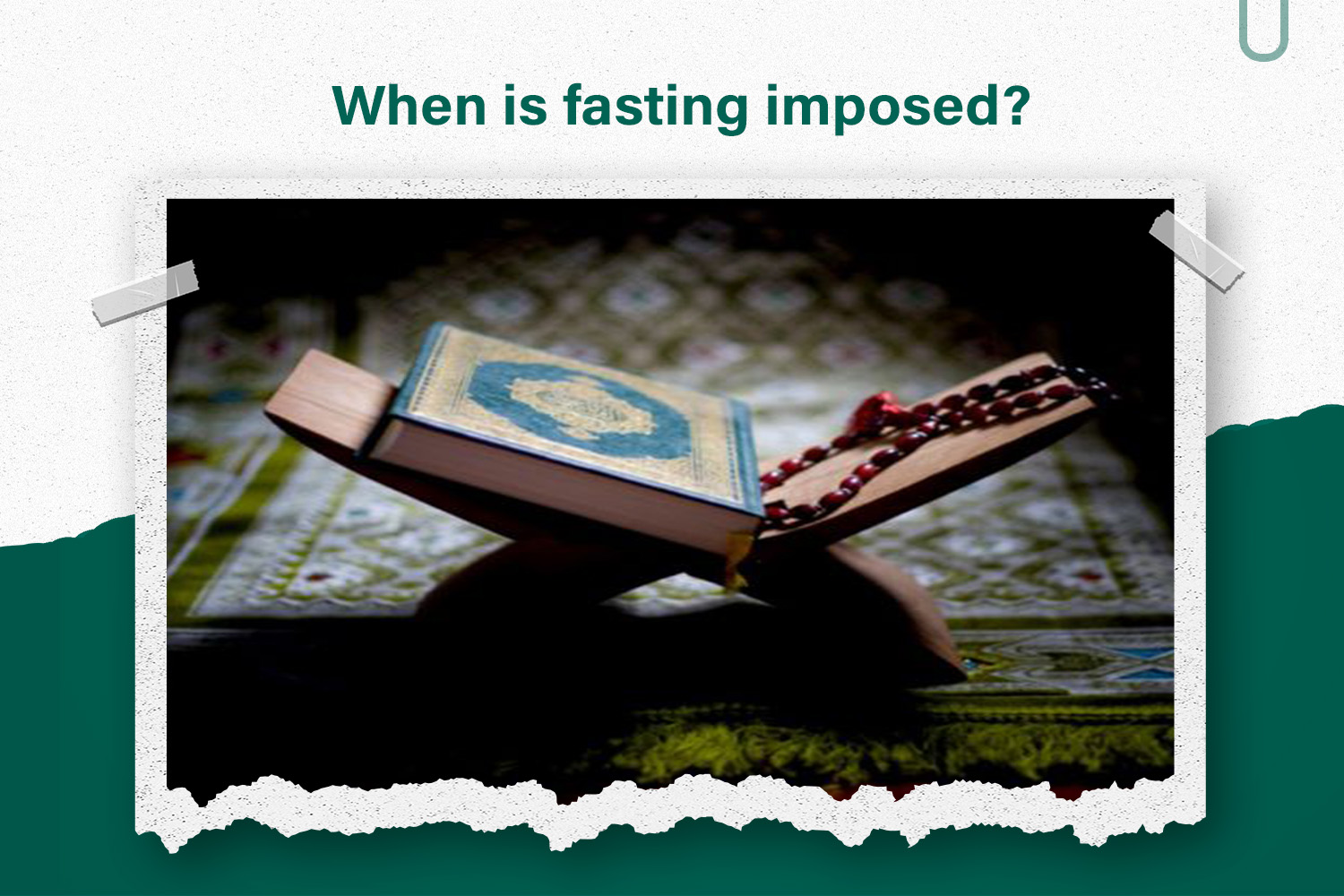The history of the imposition of fasting
The imposition of fasting in Islam dates back to the time of the Prophet Muhammad (PBUH). Fasting was imposed in the second year of emigration, after the sighting of the crescent of Ramadan was established. Since then, Muslims have been fasting the month of Ramadan annually as an expression of closeness to God and purification of soul and body.
The history of the imposition of fasting in Islam
Fasting was imposed in Islam in the second year of the hijra after it was proved to see the crescent of the month of Ramadan. Since then, Muslims have been fasting the month of Ramadan annually as an expression of closeness to Allah and purification of soul and body. The month of Ramadan is an opportunity to repent, worship and earn remuneration by performing obediences and staying away from sins.
The importance of the religious premise of fasting
The religious postulate of fasting is considered one of the five pillars of Islam, a mirror of piety and worship of Allah. Fasting is considered an opportunity for Muslims to cleanse themselves of sins and shortcomings, increase their ability to control their appetites and desires. Fasting is also considered a way to gain remuneration from God and discover their spiritual and volitional abilities.
The benefits of fasting
Fasting has many benefits for the body and soul. From a health point of view, fasting helps cleanse the body of toxins, improve digestion and metabolism. It also strengthens the immune system and increases the elasticity of cells. As for the soul, fasting enhances the control of desires, raises the level of piety and contemplation of God.

Health benefits of fasting in the body
Fasting has direct health benefits on the body. It gives the digestive system a period of rest and rebalancing, thereby helping to improve digestion. It also reduces the acidity of the stomach and helps cleanse the body of toxins and waste products. In addition, fasting strengthens the immune system and helps lower the level of cholesterol in the blood.
Spiritual and social benefits of fasting
Fasting has great spiritual benefits, as it is considered an opportunity to cleanse the soul, strengthen the Will and control physical desires. It also helps to strengthen social ties and cohesion between members of society, as people gather to have breakfast together and share sacrifice and giving. Doing fasting collectively increases the bonds between individuals and strengthens the bonds of love and communication in society.
Fasting in other religions
Fasting is also practiced in a number of other religions around the world. In Christianity, in some traditions Christians fast during the period of Great Lent before Easter. In Hinduism, believers eat a light meal at a specific time as part of a sixteen-day fasting period. Most Buddhists also participate in the Rohat-month fast.
The history of fasting in other religions
The history of fasting in other religions dates back to different time periods. In Christianity, Christians have been practicing fasting during the period of Lent before Easter since the first centuries AD. In Hinduism, sixteen-day fasting is popular and has been part of the religious tradition for more than 5,000 years. While Buddhists practice the Rohat-month fast as an important religious rite.
Similarities and differences of fasting between religions
There are similarities and differences between fasting in different religions. Fasting often focuses on drawing closer to God and spiritual cleansing. However, the timing of fasting, its duration and the types of food allowed vary between religions. For example, Muslims fast during Ramadan from dawn to sunset, while Christians fast in the summer before Easter.
Procedures and provisions related to fasting
The procedures and provisions related to fasting include fasting at the onset of dawn and until sunset. Muslims should refrain from eating and drinking, sexual intercourse, smoking during the fasting period. Muslims should also respect morality and religious values in every act, and communicate with others politely and spiritually during the holy month of Ramadan.
Donation to AHAD Association
You can donate with our association to contribute to the distribution of food baskets for Muslims in Africa, to help them with their basic needs and donations can be received from all countries of the world
Dates of fasting and Iftar in Islam
Fasting in Islam begins at the onset of dawn and lasts until sunset, as Muslims must completely abstain from eating, drinking and sexual intercourse during this period. As for the date of iftar, it is at sunset, where Muslims have the right to eat and drink after fasting for a whole day. Adherence to the established Times of fasting and iftar is considered religiously important for every Muslim.

Legal provisions related to fasting
The Sharia provisions related to fasting include several issues and conditions that a Muslim must adhere to. Among the most important of these provisions are: the intention to fast before dawn, abstaining from eating, drinking and sexual intercourse during fasting hours, avoiding forbidden acts and penances during the fasting period, and spending any fasting days missing due to Hajj or illness.
Remember, the Muslim will be steadfast in his commitment to these rulings and will be steadfast in this world and the hereafter.
The importance of religious fasting
The religious significance of fasting lies in the Muslim’s closeness to Allah and closeness to him. Fasting is an act of loving worship to God, as it promotes meditation and spiritual communication with the creator. Ramadan fasting is also an opportunity to purify and renew oneself by giving up worldly concerns and paying attention to worship, prayer and charity.
The religious and spiritual impact of fasting
Fasting has a huge impact on the religious and spiritual side of Muslims. Fasting is considered an opportunity for spiritual cleansing and renewal, as it helps to strengthen the relationship between the believer and God. In addition, fasting contributes to the strengthening of self-control and spiritual balance, which helps a Muslim in personal and spiritual growth, the development of endurance and patience.
Self-development and closeness to God through fasting
Fasting is considered an opportunity for self-development and closeness to God. Fasting can help strengthen such qualities as endurance, willpower and patience. In addition, fasting can contribute to the cleansing of hearts and souls from sordid lusts, strengthen the Muslim’s desire to follow values and good deeds.
Celebrating the month of Ramadan
Ramadan is an important religious occasion in Islam, as it is celebrated by Muslims all over the world. This month is characterized by fasting, reading the Koran, performing devotions and good deeds. Congratulations are also exchanged, charity alms and meals are given to the poor and needy. Ramadan embodies the values of solidarity and social communication among Muslims.
Traditions and customs of celebrating Ramadan
Many traditions and customs of celebrating Ramadan are known throughout the Muslim world. These traditions include families gathering for a joint breakfast, visiting mosques to perform Tarawih, exchanging congratulations and alms with others. The celebration of Ramadan also includes various kinds of entertainment such as contests and social activities. These traditions reflect the strength of solidarity and collective spirit among Muslims during this blessed month.
The importance of the holy month in the hearts of Muslims
The month of Ramadan occupies a special place in the hearts of Muslims, as it is considered an opportunity to get closer to Allah and renew spirituality. Muslims during this month get rid of worldly desires and pay great attention to reading the Koran and performing devotions. Ramadan is considered an opportunity to take a break from spiritual rest and strengthen solidarity and kindness among members of the Muslim community.
You can visit the ahad Association website to find out more about the projects it offers
Related articles:
The importance and bounty of the month of Ramadan
Join us in our message by donating




